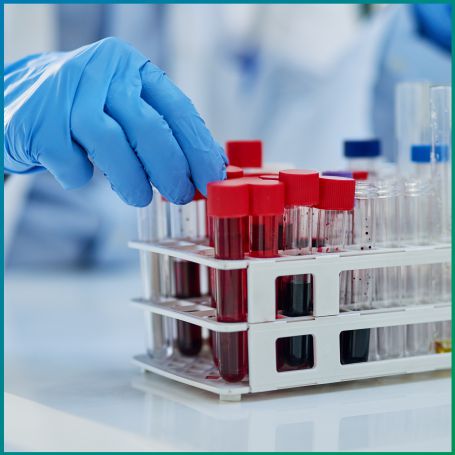
Factor VIII, also known as anti-hemophilic factor, plays a vital role in the blood coagulation process by helping blood to clot and stop excessive bleeding.


This test is essential for diagnosing, monitoring, and managing various bleeding disorders, especially hemophilia, which is caused by insufficient or defective Factor VIII. The Factor VIII assay test is a specialized blood test that measures the level of Factor VIII in the blood. This test is particularly important in diagnosing hemophilia A, a genetic disorder that leads to insufficient clotting due to a deficiency of this factor. Factor VIII is one of several clotting factors that are necessary to form a stable blood clot. The absence or reduced levels of Factor VIII can lead to excessive bleeding even from minor injuries, spontaneous internal bleeding, or excessive bleeding following surgery or trauma.
The Factor VIII assay procedure is relatively straightforward and involves drawing a blood sample from the patient. Here's a step-by-step overview of the procedure:
1] Blood Sample Collection: A healthcare professional will collect a blood sample from a vein in your arm using a sterile needle. The blood is then transferred into a test tube that contains an anticoagulant to prevent clotting before analysis.
2] Laboratory Analysis: The blood sample is sent to a laboratory, where the Factor VIII assay is performed. In this test, the laboratory assesses how well the blood can clot by measuring the activity of Factor VIII. Clotting time and other parameters are analyzed to determine the specific level of Factor VIII.
3] Reporting of Results: Once the analysis is complete, the test results are provided to the doctor, who will interpret the Factor VIII assay results and make recommendations based on the patient’s condition.
The Factor VIII assay results are typically reported as a percentage. The normal range of Factor VIII activity in the blood is between 50% and 150%. Any deviation from this range could indicate a potential bleeding disorder or clotting abnormality.
A] Normal Factor VIII Levels: Normal Factor VIII levels generally fall within the range of 50% to 150% of normal clotting activity. If a patient's results fall within this range, they are considered to have normal clotting function.
B] Low Factor VIII Levels: If the test reveals low Factor VIII levels (below 50%), the patient may be diagnosed with hemophilia A. The severity of hemophilia is classified based on the level of Factor VIII activity:
1] Severe Hemophilia: Factor VIII activity is less than 1%.
2] Moderate Hemophilia: Factor VIII activity ranges from 1% to 5%.
3] Mild Hemophilia: Factor VIII activity ranges from 6% to 49%.
C] High Factor VIII Levels: Elevated Factor VIII levels (above 150%) may occur in response to conditions such as inflammation, pregnancy, or even certain chronic diseases like heart disease and diabetes. High Factor VIII levels can increase the risk of developing thrombosis (blood clots) in veins or arteries, leading to serious complications like deep vein thrombosis (DVT) or pulmonary embolism.
At Diagnopein, we offer comprehensive, accurate, and timely diagnostic services, including the Factor VIII assay test. With our NABL-accredited labs, cutting-edge technology, and skilled technicians, you can be assured of reliable results every time. Get your results quickly, especially when time is crucial in detecting severe infections.
Competitive pricing without compromising on quality. Our team of experienced professionals ensures the test is conducted smoothly with minimal discomfort. We provide not just Factor VIII assay test results but insights into your health condition, helping you and your doctor make informed decisions about treatment. For more information call us at +91 9204 108108.
The test involves a simple blood draw from a vein, typically from the arm. The blood sample is then sent to a laboratory for analysis, where the activity of Factor VIII is measured. The procedure itself takes only a few minutes, but results may take a few days to be processed.
No, fasting is not required for the Factor VIII assay test. However, your healthcare provider may give specific instructions based on your overall health and other tests you may be undergoing simultaneously.
Yes, the Factor VIII assay test is safe. The most common side effects are mild discomfort at the site of the blood draw, such as bruising or soreness. Serious complications are extremely rare.
Symptoms that may prompt a Factor VIII assay test include Frequent, unexplained bruising. Prolonged bleeding after injury, surgery, or dental procedures. Spontaneous bleeding in joints, muscles, or soft tissues. Family history of hemophilia or other bleeding disorders.